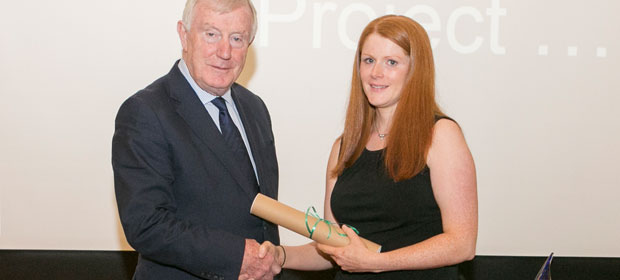“Within Our Reach: Supporting the Functional Hand Use of Children with Cerebral Palsy,” enables the delivery of evidence-based interventions which have been shown to improve children’s functional potential and allay the natural course of CP through a preventative approach, improving long-term quality of life, write Margaret McGrath and Eimear Quinlan, Occupational Therapy Department, Enable Ireland, Dublin Children’s Services, Sandymount Ave., Dublin 4.

Their project received a special commendation from the judges at this year’s HMI Leaders Award.
The International Classification of Functioning, Disability and Health (ICF Framework; WHO, 2001) redefined the way Cerebral Palsy (CP) is understood and managed (Novak et al, 2013). CP is a neurological condition which impacts on a person’s function. Occupational Therapists (OT) provide treatments that support children’s independence and participation, much of which involves maximising functional hand use.
In a systematic review of interventions for children with CP, Novak et al (2013) demonstrated that high-level clinical evidence exists for treatments used to improve functional upper limb use. Enable Ireland supports the empowerment, inclusion and enablement of children and families within their communities. This project was undertaken in line with Enable Ireland’s Strategic Plan (2014-2017) which outlines the vision of a dynamic organisation, recognized for leading service excellence.
Enable Ireland therapists in the East Region established support structures to share information and resources, remain up-to-date with research and to standardise the OT approach to management of the upper limb across the all the clinics.
The objectives of our project were:
- Develop an OT pathway for upper limb management in children with CP
- Develop support and mentoring structures which enable OTs to increase their knowledge and practical skills
- Standardise and format assessment and report documentation
- Develop templates for specific group therapy interventions
Vision
All children with an upper limb neurological impairment will receive an OT functional and postural upper limb assessment at least annually followed by the appropriate evidence-based intervention, ensuring equitable and accountable services are delivered. Hoare (2014) advised that ‘Service delivery must be consistent throughout childhood with regular reviews to pre-empt possible changes in body structure and function’.
The Manual Ability Classification System (MACS; Krumlinde-Sundholm & Eliasson, 2005) classifies function and aids children and families in long-term planning for their needs. Upper limb interventions should be appropriate to the child’s age and classified level of ability with a strong emphasis on early intervention. ‘Recent insights…strongly support the notion of ‘the earlier the better’ for provision of therapy, moving away from a restorative paradigm to one of prevention’ (Hoare, 2014). In line with Enable Ireland’s family-centered approach, parents and children are provided with support and advice to work in partnership with their OT in decision-making around goals and outcomes. They are supported to develop a clear understanding of their child’s potential for maximising functional hand use.
Enable Ireland’s commitment to developing clinical skills enables staff to work with the challenges and diverse needs of children and families; skill development in this area ensures competency in providing interventions to service users.
Benefits
- Improved standard of care and reduction in complications of growth i.e. contractures and pain
- Parent and service user satisfaction, empowerment and trust in service
- Collaborative work in the department, organisation and profession
- Development of clinical skills in line with best practice guidelines
- Medical Devices Directive Compliance Policy to safeguard users of splints and casts from risk of injury or poor practice
Transferability
Under the HSE Progressing Disability Services Model, existing children’s services will reconfigure to support the vision that each child with a disability is supported to achieve their full potential through Network Disability Teams. The HSE (2016) recognise that both the Children’s Network Disability Team and Primary Care Team will require expertise which may not solely be met by the clinicians on these teams.
The objectives of this project will be vital to support OT’s in maintaining a service that delivers upper limb interventions for children with CP, being mindful of the need for early intervention and regular reviews to pre-empt structural and functional changes (Hoare, 2014). This support will continue to be delivered through mentoring to develop skills and knowledge.
Enable Ireland therapists in the East Region established support structures to share information and resources, remain up-to-date with research and to standardise the OT approach to management of the upper limb across the all the clinics.
Conclusion
The OT Department and Enable Ireland Services continue to be strongly committed to this project; it is envisaged that the objectives and vision will continue to grow and evolve. The outcomes ensure a sustainable, high quality service to support the functional hand use of children with CP.
This is the seed which has established structures to define a clear pathway for parents, children and professionals in the area of OT upper limb management; it enables the delivery of evidence-based interventions which have been shown to improve children’s functional potential and allay the natural course of CP through a preventative approach, improving long-term quality of life.

